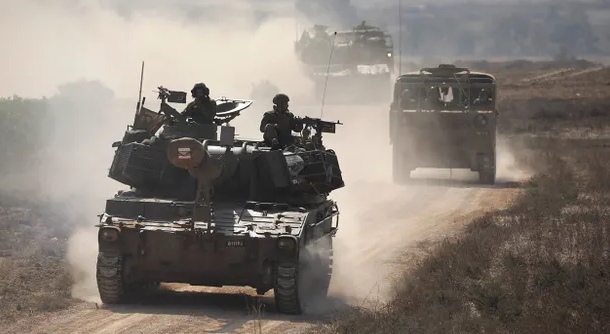US Secretary of State Antony Blinken met with Israeli leaders on Friday to push for a humanitarian pause in the Gaza war, according to Reuters.
Meanwhile, the Israeli army has surrounded the largest city in the Gaza Strip, which has become the centre of efforts to destroy Hamas. The Israeli army struck the Gaza Strip from land, sea and air all night the previous day amid global alarm over shortages, the destruction of medical services and rising civilian deaths.
Hamas and its ally Islamic Jihad said their fighters had dropped grenades from drones, detonated explosive devices against advancing troops, fired mortars and anti-tank missiles in fierce urban fighting around destroyed buildings and piles of rubble in Gaza City.
Blinken, on his second trip to Israel in a month, was due to discuss with Prime Minister Benjamin Netanyahu measures to minimise damage to civilians in Hamas-ruled Gaza, where food, fuel, water and medicine are running out, houses have been replaced by rubble and thousands have fled homes to escape constant Israeli bombardment.
Washington said any pauses in the fighting should be temporary and localised. The White House rejected calls from Arab and several other countries for a complete ceasefire in the war, which is now in its 28th day.
The Israeli military said its warplanes, artillery and navy struck Hamas targets overnight, killing several militants, including Mustafa Daloul, a Hamas commander believed to be leading the fighting in Gaza. Hamas has not yet made any comment on the matter. According to military spokesman, Rear Admiral Daniel Hagari, Gaza City is completely surrounded. He said large caches of weapons, defence gear, communications equipment and maps were discovered overnight. Daniel Hagari told in a briefing:
“The soldiers are advancing in battles, during which they are destroying terror infrastructure above ground and below ground and eliminating terrorists.”
An Israeli airstrike in Khan Younis in the southern Gaza Strip overnight killed a local journalist working for official Palestinian television and at least nine members of his immediate family.
Irish Prime Minister Leo Varadkar, in one of the harshest criticisms of Israel by a European leader, said Israel had the right to defend itself and go after Hamas, but the attack on Gaza also looked as if it was turning into “revenge”.
The United Arab Emirates, one of the few Arab states with diplomatic ties to Israel, said on Friday it was “tirelessly” pushing for an immediate ceasefire, warning that the risk of the conflict spreading across the region and escalating further was possible. Israel has vehemently denied any criticism of it and said it is targeting Hamas militants, whom it accuses of deliberately hiding among the population and civilian buildings.
Antony Blinken is due to meet Jordanian Foreign Minister Ayman Safadi in Amman on Saturday. In a statement, Safadi said Israel must end the war in Gaza, where he said it was committing war crimes by bombing civilians and imposing a total siege on a region that is home to millions of civilians.
The Israeli military said its troops and tanks are running into mines and booby traps as they advance into Gaza. Hamas militants use an extensive network of underground tunnels to launch surprise attacks. Israel said it had lost 23 soldiers in the offensive.
A spokesman for Hamas’ armed wing, Abu Ubaida, said in a televised statement that the Israeli death toll in Gaza was much higher. He said:
“Your soldiers will return in black bags.”
Two US officials, who spoke on condition of anonymity, said the United States was flying drones over the Gaza Strip collecting intelligence information to help find the hostages.
According to Gaza’s Health Ministry, at least 9,061 people – many of them women and children – have been killed since Israel began relentless bombardment of the enclave of 2.3 million people in response to deadly attacks by Hamas militants in southern Israel. Israel says Hamas militants killed more than 1,400 people, mostly civilians, and took more than 240 hostages in the 7 October attacks, the deadliest in its 75-year history.
